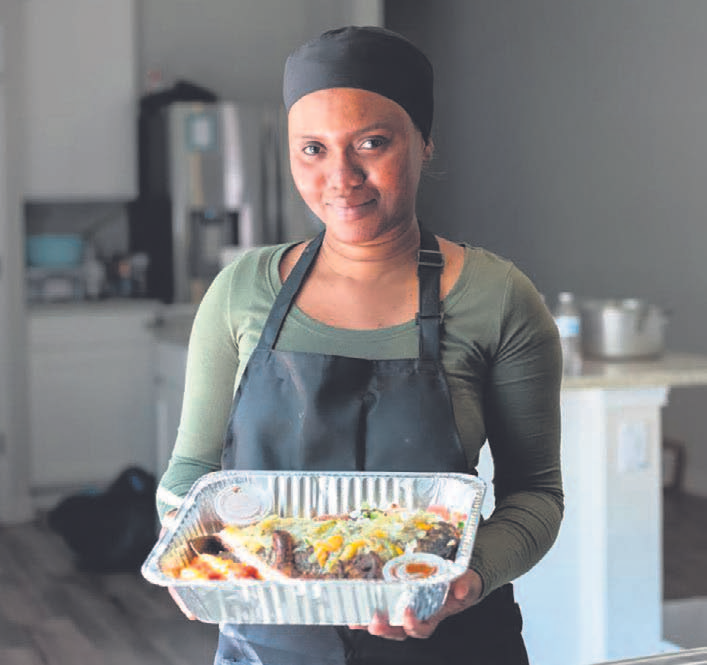
By Hank Sanders
In the small kitchen of a residence in Queens, Tiana Webb carefully turned empanadas in a bubbling pot of oil as they became crisp and golden — just as instructed by her Jamaican Puerto Rican family.
Almost 1,800 miles away in Hutto, Texas, Davila Dion pounded plantains into a stretchy bread following the techniques taught by her mother back in the Ivory Coast.
“Using a blender doesn’t achieve the flavor you aim for,” Dion explained, choosing instead a mortar and pestle to mash the fruit into dough for a dish known as fufu.
Webb’s venture, T’s Kitchen, and Dion’s enterprise, WAfrica Taste, boast a dedicated clientele.
However, neither has a physical storefront, staff, or commercial kitchen.
Rather, like countless other unlicensed chefs across the nation, Webb and Dion have successfully taken to an unexpected platform: Facebook Marketplace.
Yes, the same Facebook Marketplace. The online equivalent of a garage sale, famous for offering great bargains on previously owned furniture and electronics.
Due to the escalating costs of dining out, the pandemic, and modifications to state regulations, Marketplace along with other social media venues have transformed into a sought-after space for purchasing freshly prepared meals. On Meta’s simply designed, no-cost platform for listing nearly anything, thousands of individuals — primarily immigrants or their offspring — are running side hustles.
These home cooks operate within a kind of legal gray area, with some states enhancing cottage food laws and broadening the horizons for home-based food businesses. Unlike street food vendors and food truck proprietors, who must obtain permits that are often challenging to secure, home restaurant owners face fewer regulations and enforcement is infrequent. Many only prepare a limited number of meals daily or weekly.
“When you’re enjoying a dish she’s made, it’s nothing like what you’d get at a restaurant,” noted Brittani Bacchus, a friend and patron of Webb’s cooking. “It’s food that someone’s mom or grandmother created.”
All that Webb, 28, and Dion, 33, understand about culinary arts came from their families. Inspired by her Jamaican and Puerto Rican heritage, Webb crafts her dishes based on both culinary traditions.
“Cooking has deepened my connection to my culture,” Webb remarked.
Dion emigrated from the Ivory Coast to New Jersey at the age of 25 and moved to Hutto in March. She’s discovered that great fufu is rare in Texas.
“There are African restaurants, but they primarily feature Ethiopian or Nigerian dishes,” said Dion, a full-time mother.
After feeling the strain of inflation during the pandemic, Webb sought a side hustle, while Dion aimed to generate income from home. Both are capable cooks, but the costs linked to opening a traditional restaurant were too high, and neither could take on jobs that would pull them away from their kids.
Starting in June, Dion began promoting her home-cooked meals — a vibrant assortment of flavorful rice, succulent chicken thighs, stewed meat, and caramelized plantains — on Marketplace. Presently, she serves 30 devoted customers who enjoy her fufu, okra stew, peanut butter soup, and whole fried tilapia, charging $15 for pickup meals, plus a delivery fee.
Marketplace meals, usually packaged in aluminum catering trays or Styrofoam clamshell containers, may lack elaborate presentation but are rich in taste.
In Webb’s offering, her pernil — slow-cooked pork shoulder — effortlessly separates into tender strands at the prong of a fork. Her mac and cheese is topped with a crispy cheddar layer and a creamy inside. The star of the meal, however, is arroz con gandules, or rice with pigeon peas. The rice is perfectly seasoned and serves as the ideal canvas for the juices from the pernil.
Hoping to earn a little extra cash, Webb, who is employed in marketing, began selling food on social media in December 2023. She now garners thousands of views on her Instagram and Marketplace pages for T’s Kitchen each month, she reports.
“I was taken aback by the overwhelming response,” Webb stated. “In just the past year, it has expanded significantly.”
An instant search for “food” on Marketplace within the New York region alone reveals hundreds of entries from home cooks like Webb and Dion, presenting Pakistani, Indian, and Haitian dishes, among others.
Experts analyzing food policy and social media phenomena indicate that home-based restaurant endeavors are on the rise nationwide.
According to Cliff Lampe, a professor at the University of Michigan School of Information who studies human-computer interaction, “the practice of selling food is part of a fresh trend on Marketplace.” “It wasn’t something one would typically encounter on Marketplace five years ago.”
Nancy Qian, an economics educator at the Kellogg School of Management at Northwestern University, credits the surge in homemade meal sales on social media to labor shortages, which have pushed restaurant food costs higher, enabling home cooks to offer competitive pricing.
The Food and Drug Administration indicated in a message to The New York Times that the agency is “addressing any regulatory gaps” concerning home restaurant businesses.
A representative from Meta, Facebook’s parent company, declined to comment on inquiries regarding food sales on Marketplace, instead alluding to the platforms’ regulations allowing for food sales as long as sellers “adhere to local laws.”
Webb dreams of someday owning a house with two kitchens for legally preparing full meals from home.
But for now, that’s a future aspiration. In a couple of hours, clients would arrive to collect her empanadas, a cherished recipe passed down through generations in her family’s cookbook.
Taking a moment to gather her thoughts, she updated her Marketplace profile and flipped another empanada in the oil, observing it turn golden. She noticed a photo of her late grandfather, Ralph, on the wall. Webb reflects on him every time she prepares a meal.
